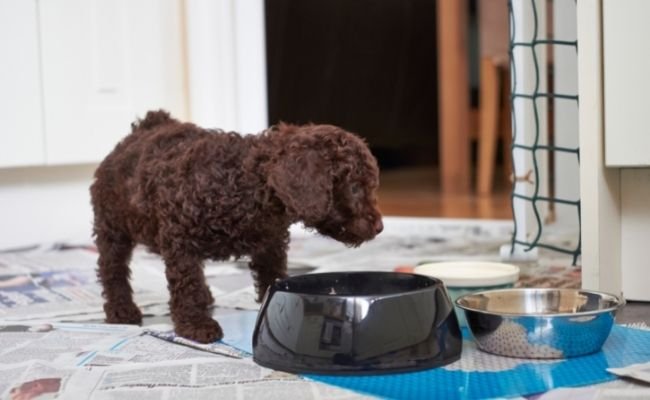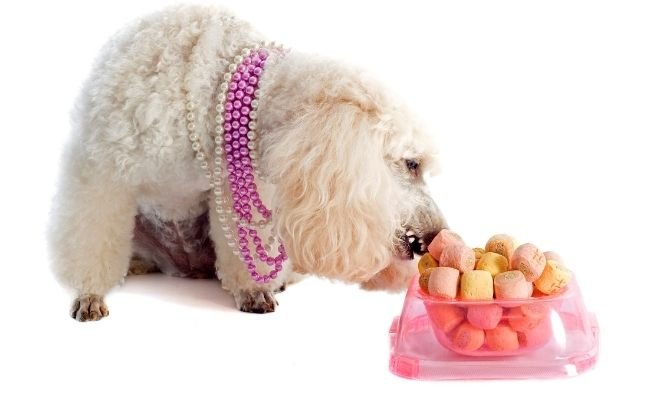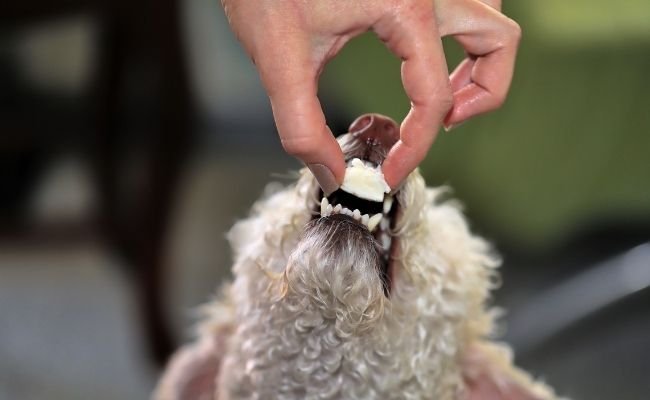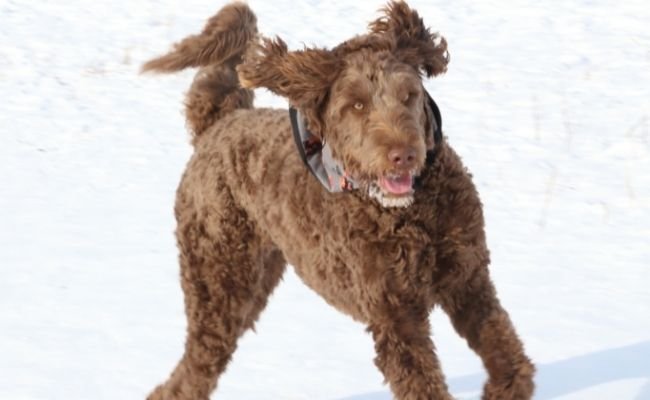Ultimate Guide To What Poodles Can (And Can’t) Eat
We all know that Poodles are adorable, smart, and many people’s favorite breed of dog. However, did you also know that they can have a hard time digesting certain things? Well, if you are yet to know, it’s high time you find out what Poodles can eat and what they should avoid.
When giving your Poodle food, ensure that you avoid the ones that are known to trigger allergic responses in the breed. Foods that contain elements like gluten, xylitol, methylxanthines, and yeast should be avoided.
Unfortunately, your Poodle won’t shy away from anything you set before them- even if it’s going to harm them. That leaves the pet parents with the bigger responsibility of deciding what their dogs should eat.
However, that does not mean we are responsible for all the wrongs done by our pups. But we all want healthy and happy furbabies, and that’s why we are going to take a look at what Poodles can eat.
Before we get started, let’s just give this disclaimer; all the meals and snacks must be given in moderation and should never replace your Poodle’s baseline diet which consists of high-quality dry food.
With that said, let’s tuck into the foods that are good for your pup:
What Poodles Can Eat

- Greens & Vegetables: celery (without seeds), cucumbers, zucchini, cabbage, broccoli, beets, carrots (no more than 2-3 strips per day), alfalfa sprouts, kale, cauliflower, red and green peppers, and lettuce
- Fruits: apples (slice them into small bits), bananas (again in moderation), blueberries, strawberries, cranberries, cherries, grapefruit, oranges (in moderation)
- Protein Sources: chicken breast (cooked or raw), lean beef/turkey/fish/shrimp without the sauce, lean ground beef/turkey/chicken (no skin), eggs (hard-boiled or scrambled)
- Nuts & Seeds: peanut butter, sunflower seeds, pumpkin seeds, and peanuts (in moderation)
- Dietary Supplements: eggshells (crushed), wheat germ, brewer’s yeast, canned pumpkin (NOT the pie filling version), flaxseed oil, or powder, and alfalfa sprouts (they contain Vitamins A, C, E, and beta-carotene).
What Can’t Poodles Eat?
I guess you now have all the information you need to get started with what Poodles can eat. Unfortunately, there are several other foods that your dog should avoid at all costs- and if they do happen to consume them, it may cause serious issues for them.
- Grains: such as wheat, oats, rye, barley, etc. They contain gluten which can cause your Poodle to feel nauseous as well as lead to serious digestion issues.
- Sugar: we all love sugar and it’s found in almost everything- even our desserts! However, not all sugars are safe for dogs- so avoid feeding them things that contain refined sugars, corn syrup, dextrose, or molasses
- Fatty Foods: like bacon, sausage-meat, doughnuts (shouldn’t be a surprise to anyone).
- Dried or Canned Beans: includes peanuts and soybeans. They can cause your Poodle to feel sick.
- Citrus Peel: the peels of oranges, lemons, and limes contain essential oils which are harmful to dogs- they can, however, eat the fruit.
- Green Tomatoes and Potatoes: this is going to be a shocker, but yes- your Poodle should stay away from them. They contain tomatine.
- Cat food: cat food is meant to be high in protein- which is not good for dogs. They have a different nutritional requirement and feeding them cat food can cause serious issues
- Avocados: contains Persin which can cause your dog’s mouth or stomach to get irritated as well as difficulty breathing, vomiting, and diarrhea.
- Raw Meat: because of the risk of parasitic infections.
- Alcohol: Drinking alcohol can affect your dog’s nervous system, can make them wobbly on their feet, and could lead to coma or death.
- Chocolate: includes flavored chocolate which has cocoa as its main ingredient- it contains theobromine which is very harmful to dogs.
- Xylitol: sweetener found in sugar-free food and gum which can cause a quick drop in blood sugar levels as well as liver failure (it can be potentially fatal).
- Nuts: almost all nuts are safe for dogs, however, macadamia nuts are the exception-they contain a toxin that causes vomiting and diarrhea.
- Garlic or Onion Powder: contains sulfoxides and disulfides which can affect blood’s capability to carry oxygen in your dog’s body and
- Macadamia Nuts: contains elements that damage the cells of dogs’ livers- it’ll also cause vomiting, hypersalivation, and a lack of coordination.
- Coffee: Coffee contains caffeine and excessive coffee can be poisonous.
- Grapes & Raisins: the substances found in these fruits can cause kidney failure if consumed in large amounts.
- Cooked Bones: It may be tempting to give your Poodle a cooked bone, but it can easily splinter and cause internal damage.
- Milk and Milk-Based Foods: milk and milk-based food can cause digestive problems for your dog.
The list doesn’t end here- there are many things that you should avoid giving your pups. It’s advisable to read the ingredients on the food label every time you buy something for your dog.
If you aren’t sure of whether or not a certain product is safe for your Poodle, the best thing is to avoid it. You can then contact your veterinary clinic or a professional breeder.
How Much Food Does Your Poodle Need?
Poodles usually need to eat around 1.5-2 cups of food per day, divided into at least two meals and given in small amounts at a time. They may require more food if they live in colder areas or are having puppies.
Other factors that can affect how much food your Poodle eats include; age, health, activity level, etc.
It’s important that you monitor your dog’s food intake- some dogs have sensitive stomachs and can’t handle eating too much at once or else they’ll start vomiting, so always keep it in check.
Poodle’s Nutritional Requirements
Poodles require an adequate amount of protein, between 19-25% in their diet. This is also affected by other factors mentioned above, but it’s quite easy to meet your dog’s requirements.
They also need to get enough vitamins and minerals every day- dogs can’t produce these themselves, so they need to be provided in their food. They also require water (obviously).
Poodles have no dietary requirements regarding fat intake- some owners think that it’s good for them because it helps with the coat, but this isn’t true. It can be harmful if consumed in large amounts though, so don’t go around feeding your Poodle fat just for the sake of it.
Poodles require a certain amount of fiber as well- this regulates the dog’s digestion system and also keeps their blood sugar level stable. The required amount is around 1-2% of your dog’s diet.
Last but not least, Poodles also require carbohydrates in their diet which can be provided by rice, pasta, breadcrumbs, etc. Carbohydrates aren’t too important to your poodle’s diet- they may just need some grains if they don’t have diabetes.
Final Verdict
As you can see, Poodles can eat a wide variety of foods, however, there are some things that they should never have. Thankfully, it’s easy to avoid poisonous food for your dog- all you need to do is read the label every time you give something new to them. It’s also important that you monitor their intake and not just feed your Poodle whenever they bark.







